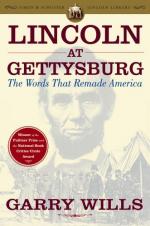|
This section contains 768 words (approx. 2 pages at 400 words per page) |

|
Lincoln at Gettysburg: The Words that Remade America Summary & Study Guide Description
Lincoln at Gettysburg: The Words that Remade America Summary & Study Guide includes comprehensive information and analysis to help you understand the book. This study guide contains the following sections:
This detailed literature summary also contains Topics for Discussion and a Free Quiz on Lincoln at Gettysburg: The Words that Remade America by Garry Wills.
This book is about one speech given at one place on one occasion, that is — President Abraham Lincoln's famous speech at the dedication of the cemetery at Gettysburg, Pennsylvania. Lincoln spoke at a ceremony held November 19,1863, about four months after the Battle of Gettysburg.
The Battle of Gettysburg was the turning point of the Civil War. General Robert E. Lee had tried to invade the north with his Confederate Army of about 75,000. They were met by the Union Army of 97,000 led by General George S. Meade at Gettysburg. After three terrible days of fighting, July 1-3,1863, over 40,000 lay dead. Lee retreated into Virginia, and Meade was faulted for not pursuing him. Nevertheless, Lee never again tried a full-force invasion which, changed the course of the war.
Lincoln's job was to find meaning in this terrible tragedy, and to justify the continuation of the slaughter that was the Civil War. He was called upon to give only a few brief remarks. The main speaker, Edward Everett, spoke for over two hours and gave a detailed account of the battle. Both Lincoln and Everett were aware of the traditions and rules of Greek oratory, as the United States was experiencing a fad for ancient Greek. The Greek revival was particularly evident in architecture and oratory. Both speeches followed the forms of Greek funeral oratory.
The people of this era were living in what Wills calls "a culture of death." It was fashionable then to visit cemeteries and make a public display of mourning for loved ones. Rural cemeteries, in particular, offered the best opportunity for people to contemplate the meaning of life and death and have a "transcendent" experience of God and the universe, according to the current philosophical movement called "transcendentalism."
Wills writes that the Gettysburg Address achieved a "revolution in thought" and "a revolution in style." Although Lincoln's speech followed the structure of a Greek oratory, his words were simple, direct, and modern, unlike the flowery ornamental style of the leading orators of his times like Everett, Webster and Clay. The style of the Gettysburg Address influenced subsequent politicians to speak more plainly.
Lincoln's words changed the course of American history and caused not only a revolution on style but also in thought. Wills argues that Lincoln defines the United States as a people united by three ideals of freedom that were first articulated in the Declaration of Independence. These ideals are that 1) all men are created equal; 2) they have the right to life, liberty and pursuit of happiness; and 3) a government's job is to protect the rights of the people. This is a radical change from the older theory that kings have the divine right to rule, and people have no rights except those bestowed by their king. The Declaration of Independence, with its ideals of government, becomes the United States' founding document instead of its Constitution. The Constitution is a work-in-progress, constantly changing and becoming updated to better reflect the ideals of the Declaration.
By referring to the ideals of the Declaration, Lincoln implies that slavery is wrong because all men, regardless of race, nationality or origin, have inalienable rights. By referring to the United States as one people, he does not acquiescence to the fact that the South has already seceded from the Union. Indeed, throughout his presidency, Lincoln referred to the Confederate Army as "rebels" not an enemy, and caught up in a "rebellion" not a war. He thought of himself as president of both the North and South, and that the Civil War was a police action to quell rebellion in one section of the country. This gave him more political leeway to sign the Emancipation Proclamation as a military measure. Freed slaves could help the Northern Army quell the rebellion. Lincoln was unique as a war leader in that he never used the language of victory and triumph.
In his Second Inaugural Speech, Lincoln refers to Southerners as "neighbors," and implores "We are not enemies, but friends. We must not be enemies." Author Wills believes that a combined study of the Gettysburg and the Second Inaugural speeches gives a true picture of Lincoln's beliefs about his country and slavery. In the Second Inaugural, slavery becomes a sin. God requires the entire country to pay for the sin of slavery by shedding blood during the Civil War.
Wills believes that Lincoln found the words that "remade America." He writes "In the crucible of the occasion, Lincoln distilled the meaning of the war, of the nation's purpose, of the remaining task, in a statement that is straightforward and magical."
Read more from the Study Guide
|
This section contains 768 words (approx. 2 pages at 400 words per page) |

|



